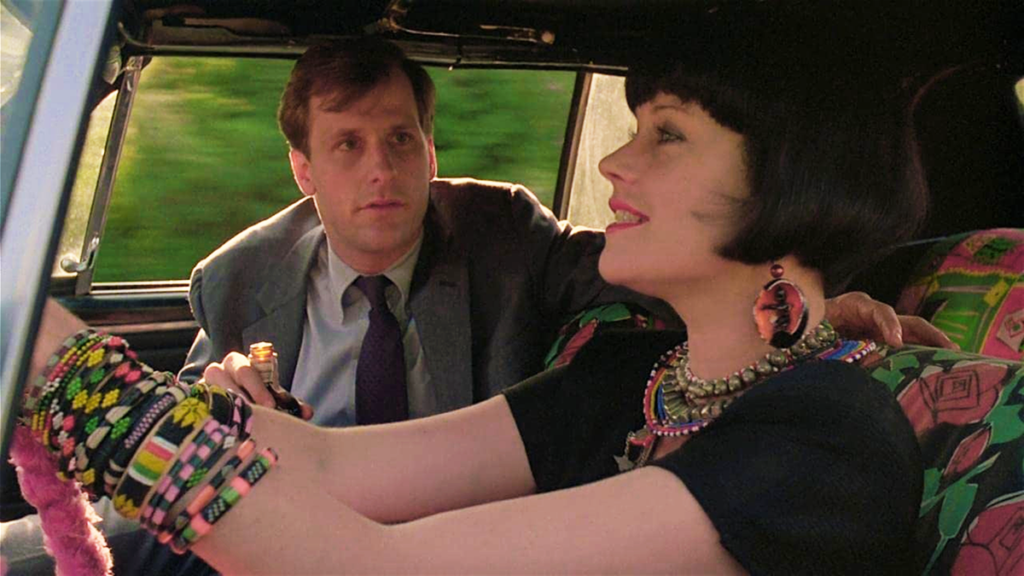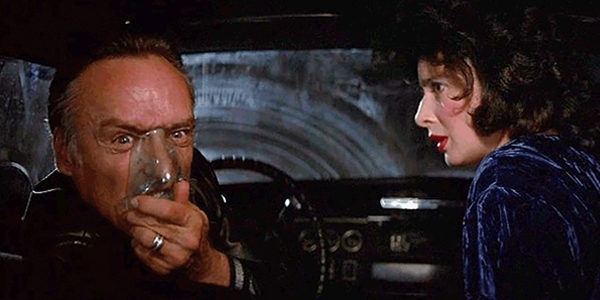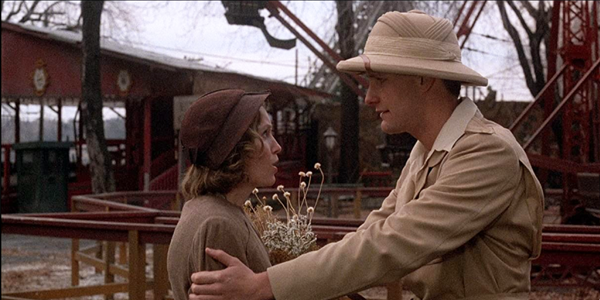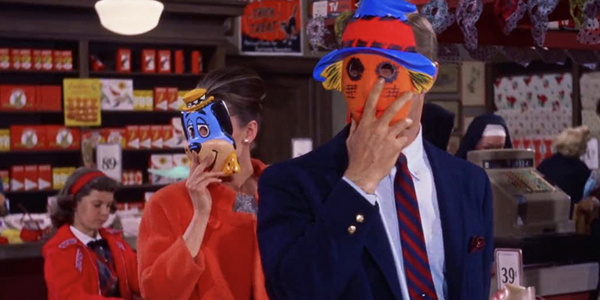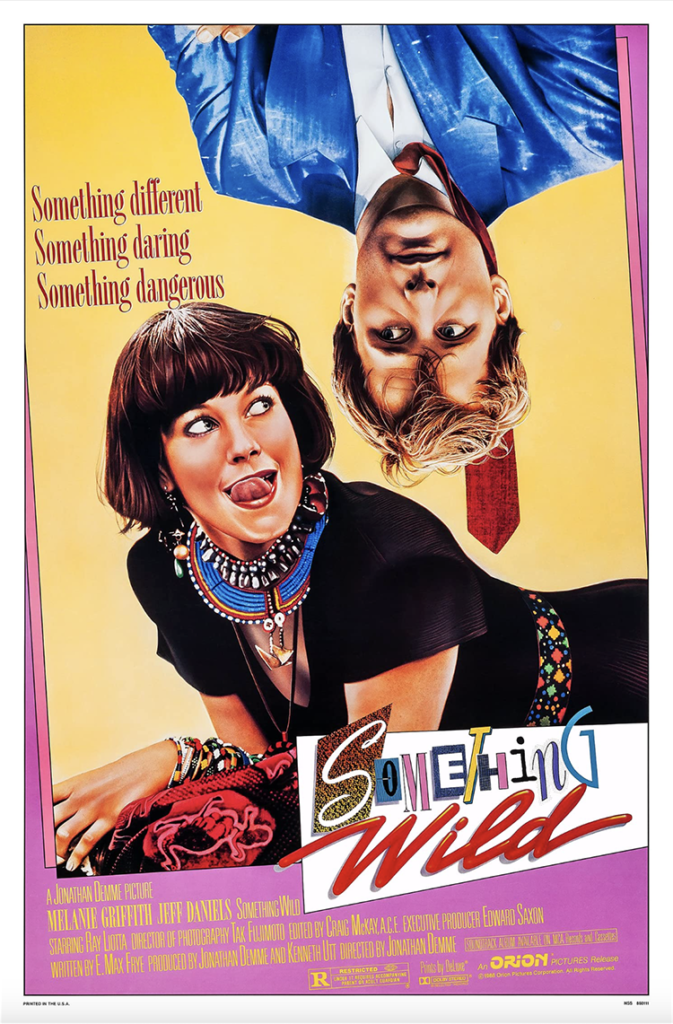also on Cineluxe
Sign up for our monthly newsletter
to stay up to date on Cineluxe
This comedy-drama road film from the ’80s rises above its mediocre direction thanks mainly to defining performances by Jeff Daniels and Ray Liotta
by Michael Gaughn
March 24, 2023
Can we all now agree that Jonathan Demme just wasn’t a very good filmmaker? From the too-tall-tale-ish Melvin and Howard to the preppy pretentiousness of Stop Making Sense to the cringe-inducing Married to the Mob to the inexcusable cartoonishness of Silence of the Lambs to the TV-movie angst of Philadelphia to the sheer pointlessness of his Manchurian Candidate and the half-baked flailing of Rachel Getting Married, Demme could just never transcend his limitations long enough to rise to the first rank. Ultimately he was simultaneously too conservative and too progressive, unable to subsume his leanings into his work, and ultimately that work was just too thin to stand the test of time.
The closest he ever got to doing a really good movie was Something Wild, and that succeeds mainly because of a rock-solid script and still astonishing performances by Jeff Daniels and newcomer Ray Liotta and, to a lesser degree, Melanie Giffith. If it were possible to scrape away all the hip-political gingerbread Demme spread indiscriminately over the proceedings, it might just possibly qualify as great. But all that utterly extraneous gunk is now so congealed and ossified that you constantly have to peer around it to discern the movie’s strengths.
Something Wild is strikingly similar to Blake Edwards’ Blind Date, released around the same time, with both being ill-considered attempts to drag Bringing Up Baby kicking and screaming into the ‘80s—conservative young man gets pulled into the orbit of wild young woman and chaos ensues. It also overlaps substantially with Lynch’s Blue Velvet—also from the same time—with the naive young man having to vanquish the irredeemable baddie. There must have been something in the air—and that something was the crumbling of the insubstantial illusion of the Reagan era. After six years, its essential hollowness, hypocrisy, and nastiness were becoming apparent even to its boosters.
But what played out next was unprecedented. Rather than accept what we were being shown and do some badly needed soul-searching, we decided to double down on the illusion and say we’d rather get lost in obviously curdled fantasy than accept an unpleasant but too obvious truth. And that’s what ultimately kicks the props out from under Something Wild. By trying to have it both ways, saying there’s something rotten at the core and that it’s all ultimately going to somehow be OK, it lands exactly nowhere—which makes it a kind of harbinger for the all-things-to-everyone-and-nothing-to-anyone cinema of today.
What all these filmmakers missed was the insidious rise of the technocratic gods and how easily we’d be pacified by their seemingly empowering but ultimately self-serving and oppressive fictions. Thinking the human dimension still mattered, they failed to see not only that it was being reduced to a convenient shell of dichotomous stereotypes but that they were actively aiding in that dismantling. It’s a little scary how accurately Demme anticipates the delusional bleak, blinkered, and ruthlessly judgmental pre-adolescent utopianism that’s overrun contemporary pop culture.
He’d like you to think he’s being radical but here, as in all his work, Demme is just doing penance for his Liberal guilt. Any film that opens with blatant cultural appropriation, with David Byrne croaking out lily-white salsa behind the titles, obviously has its priorities all knotted up. By the time the credit comes up for the predictably forgettable John Cale/Laurie Anderson score, you know you’re solidly in the ‘80s Downtown art scene that smoothed down the waves of the ’70s and laid the foundation for the robber barons who seized and devoured Manhattan whole in the ‘90s. (For a more honest and infinitely more creative take on all this, see Scorsese’s “Life Lessons,” the first section of New York Stories.)
Critics went ape over Tak Fujimoto’s cinematography at the time. It has its moments but it’s not that good, and a lot of it now feels not just affected but dreary. But it is well enough served by the 1080p presentation on Amazon. As with so much on that service, it’s not exceptional but isn’t compromised enough that you’ll be lunging for the remote to click off. The stereo mix is similarly serviceable—certainly not distracting. It’s hard to see where Atmos would bring much to the experience—better to leave the mix alone and treat the film as a product of its time.
Something Wild is fascinating as a cultural artifact—showing how political convictions can warp creation and blind you to the present. Demme is almost irrelevant to what’s best about the film, but somebody had to be there to say “Action!” If you’ve never seen it, it’s worth watching for the leads. And if it’s been a while, revisit it—once.
Michael Gaughn—The Absolute Sound, The Perfect Vision, Wideband, Stereo Review, Sound & Vision, The Rayva Roundtable, marketing, product design, some theater designs, a couple TV shows, some commercials, and now this.
© 2023 Cineluxe LLC


